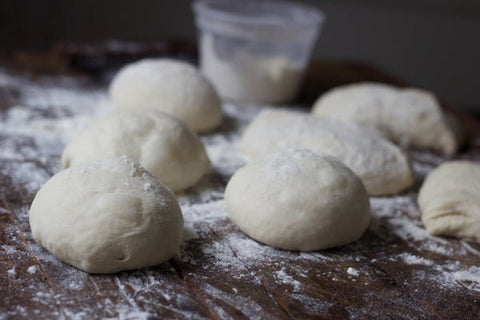This dough wouldn’t exist without two breakthroughs: Jim Lahey’s no-knead method and the invention of the Baking Steel. Lahey’s simple, 70% hydration formula changed everything. But once I created the Baking Steel, I saw its full potential.
I didn’t tweak the hydration, I leveled up the flour. I used higher-protein flour and extended the fermentation to 72 hours. That gave the dough more strength, better structure, and a deeper flavor—designed to thrive on the intense heat of the Baking Steel Original. This isn’t just a great dough. It’s a dough built to shine on steel.
Why 72-Hour Pizza Dough?
The short answer? Time builds flavor. And structure. And confidence. When you slow things down, wild things happen. The dough develops a deeper, more complex flavor. Gluten strengthens naturally without aggressive kneading. The crust bakes up with that perfect chew and blistered bottom.
Most people try to rush dough. 72-hour pizza dough forces patience—and rewards you every single time. Don’t have 3 days? Try our 24-hour dough recipe.
Watch: The 72-Hour Dough Process
72-Hour Pizza Dough
Prep Time: 15 minutes | Fermentation: 72 hours | Yield: 3 dough balls (12–14″ pizzas)
Want more or fewer pies? Keep your hydration perfect and scale this recipe up or down with our Dough Calculator .
Ingredients
- 500 g bread flour (we recommend Central Milling Organic)
- 16 g sea salt
- 1 g instant yeast (about ¼ tsp)
- 350 g water (room temp)
Instructions
- In a large bowl, add the flour. Sprinkle the yeast over the top and whisk to distribute evenly. Add the salt and whisk again—this keeps yeast and salt from direct contact too soon.
- Pour in the water and mix with hands or a dough whisk until fully hydrated and no dry spots remain.
- With damp hands, knead in the bowl for 2–3 minutes until a slightly sticky mass forms.
- Cover and rise at room temperature for 24 hours; it should roughly double and show small bubbles.
- Refrigerate for 48 hours to slow-ferment and build flavor/strength.
- Remove from fridge, divide and ball. Proof covered 3–4 hours at room temp.
- Stretch, top, and bake on a thoroughly preheated steel (see tips). It’s a game changer.
Pro Tips
- 💪 Don’t skip the rest after balling—this is when the dough relaxes and becomes a dream to stretch.
- 📏 Use a digital scale. Precision = consistency.
- 🧊 Sweet spot is 72–96 hours; beyond that structure can fade.
- 📦 Store dough airtight in a dough container to keep the fridge clean and the dough protected.
- 🔥 Preheat your Baking Steel Original for at least 45 minutes at 500–550°F for that blistered, crisp bottom.
FAQs
Can I use all-purpose flour instead of bread flour?
You can, but bread flour’s higher protein gives better structure and chew. If using all-purpose, reduce water slightly (5–10 g) to avoid over-hydration.
Do I need to use a Baking Steel?
No, but it’s a major upgrade. A preheated Baking Steel delivers the intense bottom heat that makes this dough shine. No Baking Steel, a pizza stone will work or try the back side of a sheet tray.
Can I freeze this dough?
Yes. After the 72-hour fermentation, divide and ball, oil lightly, and freeze airtight. Thaw overnight in the fridge, then bring to room temp 3–4 hours before baking. More: freezing dough guide.
How do I know when it’s ready?
It should feel soft and puffy, stretching easily without tearing. If it’s tight or resistant, give it more room-temp time.
Your oven can’t hit 800°F but your steel can store the kind of heat that transforms this dough. If you want that rise, crunch, and blistered bottom at home, bake on the Baking Steel Original.
About the Author
Andris Lagsdin is the founder of Baking Steel and a lifelong pizza enthusiast. He developed the original Baking Steel after blending his background in culinary arts with time in his family’s steel business. When he’s not testing dough formulas or teaching pizza classes, he’s sharing behind-the-scenes experiments and living fully—one pizza at a time.
More recipes from Andris:
– Classic Cheese Pizza
– Pepperoni Pizza
– Homemade English Muffins
